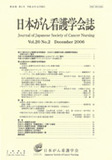Japanese
English
- 販売していません
- Abstract 文献概要
- 参考文献 Reference
- サイト内被引用 Cited by
要旨
本研究の目的は,化学療法を受けたがん患者の倦怠感の特性を明らかにすることである.11名の対象との非構造化面接によりデータを収集し,質的帰納的分析を行った結果,次のことが明らかになった.
1.化学療法を受けたがん患者の倦怠感は,【倦怠感の経験】【倦怠感に対するセルフケア】【影響要因】の3つの要素が,連続的に相互に作用するプロセスの中に経験されるものであった.
2.【倦怠感の経験】は,《日常的な動作を行うことへの消耗感》《活動に対する意欲の減退》《活動性の低下》《自分の心身に対する違和感》《抵抗できないほどの眠気》《持続的な感覚》《狭い範囲での軽い活動では自覚しない感覚》《家庭生活に戻り活動量が増えたときに知覚する,活動耐性の低下》《心理社会的な負の影響》という特性があった.
3.【倦怠感に対するセルフケア】は《休息または活動量の調整によるエネルギー消耗の制限》《自己の高揚および一般的な健康増進行動の実践によるエネルギーの獲得》《気分転換によるエネルギー消耗の制限およびエネルギーの獲得》《活動のためのエネルギーの維持》に特徴づけられる行動であった.
4.【影響要因】は,《身体的要因》《精神的要因》から構成された.
患者が知覚した倦怠感の主要な側面はエネルギーの枯渇感に特徴づけられ,その存在自体が苦痛であると同時に,自己コントロール感の喪失や心理社会的影響などによる苦痛を招くものであった.本研究結果より,化学療法を受けたがん患者の倦怠感をアセスメントする視点,セルフケア教育の方向性,影響要因に対する積極的介入の必要性が示唆された.
Abstract
The purpose of this study is to explore the experience of fatigue in cancer patients receiving chemotherapy. Eleven patients participated in this study. Data were collected through unstructured interviews and were analyzed using a qualitative method. Categories and dimensions emerged from the data as follows; experiences of fatigue (feeling exhausted during daily activities, decreased desire to be active, less mobile, feeling out of control, unusual sleepiness, incomplete thought, no difficulty in limited activities, decreased endurance during activities when out of hospital, affected psycho - social aspects negatively), self - care for coping with fatigue(limiting expenditure of energy by rest or adjusting activities, getting energy by uplifting themselves or common health - improving behavior, limiting and getting energy from distractions, preserving energy through exercises), and factors influencing fatigue(physical, emotional). Fatigue was demonstrated as an experience of process that these categories affected mutually and consecutively, and it was impossible to determine where these experiences of fatigue were processed. Fatigue was also illustrated by energy level changes. That is, a major aspect of experiencing fatigue involved a feeling of energy depletion, and such feeling initiated self - care behavior to control energy level. Findings in this research suggested that information about fatigue such as the anticipation of appearance, period and degree is needed by cancer patients receiving chemotherapy and should be given before the beginning of chemotherapy. It is also suggested that self - care education that does not excessively emphasize limiting expenditure of energy is needed. Furthermore, it was shown that controlling other symptoms such as nausea had an important impact on controlling fatigue . Further research on patints' perspectives is needed to deepen understanding of fatigue in cancer patients receiving chemotherapy and to develop effective nursing interventions.
Copyright © 2006, Japanese Society of Cancer Nursing All rights reserved.


